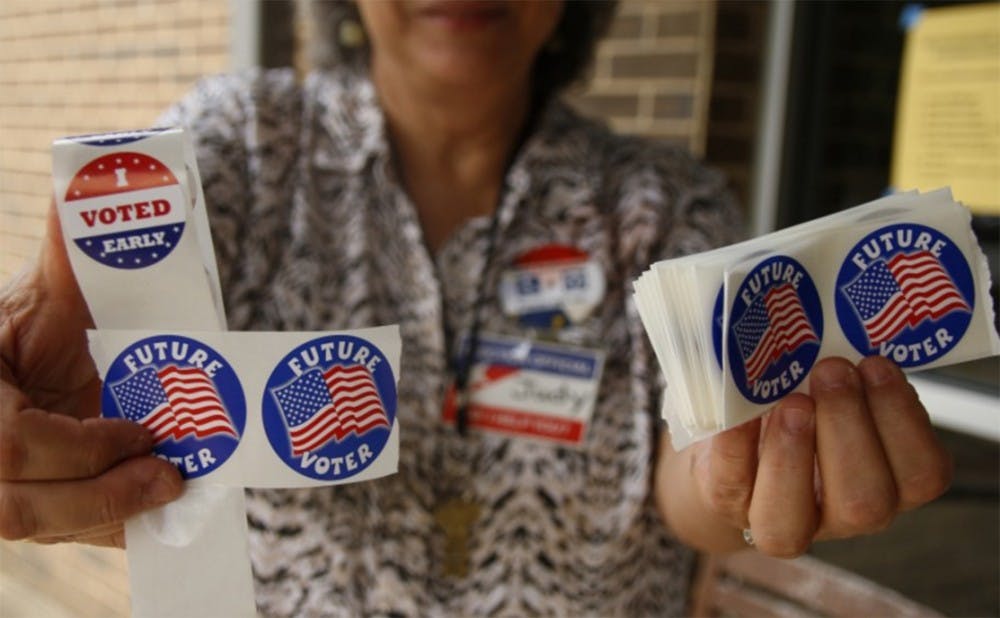Election day is in just a few days. On campus, I’ve seen parties, panels, and programming to promote student voting. Off campus, as I’ve canvassed Durham for early voting, I’ve seen huge amounts of volunteers taking time to help others vote. North Carolina is already seeing incredible turnout of early voters. With the prospect of Democrats taking back the House and candidates like Beto O’Rourke, Stacey Abrams and Andrew Gillum catching support like wildfire, talk of electoral politics is near impossible to avoid.
Yet as I’ve knocked on doors and sold strangers on the power of the ballot, I can’t help but considering what will happen to this incredible momentum after November 6th.
Political change is often long and slow, so sustaining this momentum beyond just Election Day is should be an issue of concern. Is our campus’s political discourse reflective of this truth? We often hear and say: VOTE, VOTE, VOTE! (To be fair, I may be quoting myself here)
But vote, and then what?
Historically, engaging with American democracy has never meant simply voting. And for our political discourse to suggest “vote, and leave it at that,” is a grand disservice to the history of political change in our country.
Progress is not something that happens every two years with the local board of elections. It’s a long march that keeps moving after you cast your vote. Progress doesn’t happen just because we elect the right people. Movements make change, not politicians.
The New Deal didn’t happen simply Franklin Roosevelt won office. Before 1932, a massive movement of organized labor in the United States had elevated the plight of the worker to the highest level, demanding federal intervention. There were huge movements of unionists and communists even in places like Alabama and all across the Black Belt. Massive strikes were met with deadly state violence. Movements, not politicians alone, brought us the eight-hour workday, collective bargaining and overtime pay.
The Civil Rights movement was not handed down to us by the election of John F. Kennedy, nor the efforts of Lyndon B. Johnson alone. To examine the Civil Rights movement solely through a lens of electoral politics and legislative calculus is to ignore the reality of hard, long struggle for freedom. Boycotts, demonstrations, historic marches, radical organizing and coalitions challenged oppressive structures and were met with galvanizing moments of state repression. Movements, not politicians alone, brought us the Civil Rights Act of 1964 and Voting Rights Act of 1965.
Same-sex marriage wasn’t brought to us by a single Supreme Court case. Queer activists acted as a thorn in President Obama’s side throughout his two terms, pushing against his discomfort and hesitance to ultimately win Senate repeal of Don’t Ask, Don’t Tell, and forcing him to come out in support of same-sex marriage. Years of LGBT activism and legal strategy laid the ground for legalization in multiple states and pushed cases to the federal level to challenge discrimination. Movements, not politicians alone, brought us the historic Obergefell v. Hodges.
Issues on Duke’s campus are no different; we are nearing the 50th anniversary of the longest student strike in history. Students formed an incredible coalition of Black, Latino, Asian, white students in the Third World Liberation Front that demanded the recognition of the histories of people of color. Thus, African American Studies, Asian American Studies, Latino Studies, and other courses of study dedicated to minority experiences in the U.S. were born. Over a decade of sustained student activism, not the kindness of administrators, brought us Duke’s Asian American Studies program.
To believe that civic engagement ends at voting is to forgo our own historic sense of agency. We must refuse the notion that politicians are speaking for us because we cannot speak for ourselves. We must instead embrace the notion that we can speak for ourselves, and will organize for our own futures. Our elected officials must be our representatives, not our saviors.
Electoral politics will always be at the core of democratic change, but we need to do more than vote if we want our electoral politics to work. Elected officials, no matter how brave, cannot alone be champions of our causes. Officials we elect will be hard-pressed to accomplish much without continued support and challenge from movements.
Imperfect as it is, we live in a democracy. And to fully embrace that ideal, to fully take the future of our society into our own hands, is to challenge the notion that ‘civic engagement’ ends at voting. Voting is just one means for us to grasp the future and shape society for the better. It’s just one crucial tool in the toolbox, and we need every single tool to build this house.
So Duke students, after you vote: As we move back into the daily struggle of cramming for midterms, meeting deadlines and preparing for careers, remember that the agency to build and create lasting change is still in your hands long after you leave the ballot box.
We have to reject what Reverend William Barber calls the ‘one moment mentality’ of this election. We have to vote, and then some.
Lance Tran is a Trinity senior. His column usually runs on alternate Tuesdays.
Get The Chronicle straight to your inbox
Sign up for our weekly newsletter. Cancel at any time.

